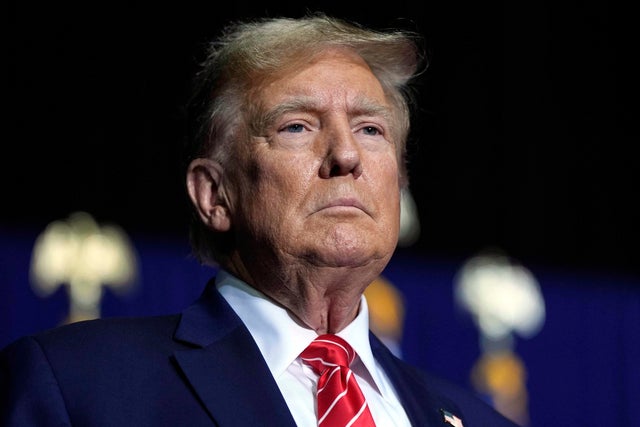What happens next in Georgia's election interference case? Legal experts break down the path forward
The last remaining criminal case against President Donald Trump survived what could have been a knockout blow, but it's coming out of the corner looking very different.
On the same day Fulton County Superior Court Judge Scott McAfee officially dropped three charges in Georgia's 2020 election interference case, a new prosecutor stepped in, inheriting a sprawling indictment, a politically radioactive file, and some hard choices about what comes next.
Legal experts say the future of the racketeering indictment against former President Donald Trump and his allies is more uncertain than ever.
Dr. Anthony Michael Kreis, a constitutional law professor at Georgia State University, told CBS Atlanta the biggest questions ahead are "political and practical, rather than legal."
Most legal challenges have already failed
"A Fulton County Grand Jury found that there was sufficient evidence to suggest that crimes may have been committed... and most of the motions challenging the charges have been rejected by Judge McAfee," Kreis said.
But the case stalled after the Georgia Court of Appeals disqualified District Attorney Fani Willis from continuing to prosecute it.
That decision shifted all authority to Prosecuting Attorneys' Council director Pete Skandalakis, who now has three core choices to explore, legal experts say:
- Continue with most of Willis' original strategy.
- Slim the case down with fewer defendants, fewer counts, or both.
- Dismiss some or all of the remaining charges.
Trump's return to the Presidency changes the legal landscape
Kreis says the U.S. Supreme Court's presidential immunity decision once raised significant constitutional questions about whether Georgia could prosecute Trump.
But now, that debate may no longer matter.
"Now that he is president again, that question has been effectively mooted because the state can't go forward against a sitting president," Kreis said. "That part of the case was the most susceptible to a constitutional attack."
He added that the other defendants no longer have any plausible constitutional claims blocking prosecution.
What changed and what didn't
McAfee's ruling dismissed Counts 14, 15 and 27 , all tied to conspiracy and attempts to file false documents, two of which directly named Trump.
Even with those charges gone, over 30 counts remain, including the centerpiece racketeering charge against Trump and 18 other defendants alleging a coordinated effort to overturn his narrow 2020 loss in Georgia.
McAfee also rejected broader arguments that the entire indictment violates the U.S. Constitution's Supremacy Clause, indicating that, at least for now, the case as a whole remains intact.
The ruling landed just hours after the state's new lead prosecutor, Pete Skandalakis, formally took control of the case.
Defense strategy: Delay was the goal
Kreis noted that defense attorneys executed a "highly effective" strategy: delay the case until after the 2024 election.
"These clients' best interests were served by removing the Fulton County DA from the case, delaying the potential trial date, and demanding that the state lay out the theory supporting the charges in detail," he said.
"The tactic to drag matters out was especially important for President Trump as he sought a second term in office."
He credited attorneys, including Ashleigh Merchant, Steve Sadow, and Chris Anulewicz, with using "vigorous motions practice" to slow the case and weaken the prosecution's position.
CBS Atlanta has reached out to Ms. Merchant, Mr. Sadow, and Mr. Anulewicz for comment.
What the new prosecutor must decide
Skandalakis, the executive director of the Prosecuting Attorneys' Council of Georgia, appointed himself to replace disqualified Fulton County District Attorney Fani Willis after he said "several" other prosecutors turned the job down.
In public statements, Skandalakis has used extreme caution. He says he's still working through 101 boxes of documents and an eight-terabyte hard drive that holds the full investigative file.
"The public has a legitimate interest in the outcome of this case," he wrote. "Accordingly, it is important that someone make an informed and transparent determination about how best to proceed."
Kreis says the future of the case now rests squarely with Skandalakis.
"The timeline ultimately depends on what Pete Skandalakis chooses to do with the case… It is anyone's guess," Kreis said.
However, Kreis says the new prosecutor will have a series of critical decisions to make:
- Evaluate the evidence and reassess the strength of the indictment
- Decide whether convictions are realistically attainable
- Determine the resources needed to try such a large, complex case
- Choose whether to pursue all charges, negotiate plea deals, or streamline the case
- Consider whether to abandon elements of the racketeering theory
"Ultimately, the new prosecutor will have to evaluate the evidence… and contemplate what path forward is in the best interest of justice," Kreis said. "That might mean dismissing some charges, striking plea deals, or taking a different strategy than Fani Willis's racketeering theory."
What to watch next
For now, the key date is Dec. 1, when McAfee has ordered all sides back to court for a status conference.
What's already clear is that despite a handful of dropped charges and months of drama over who would prosecute it, Georgia's election interference case is still moving.
For now, the next moves belong to a low-profile prosecutor now holding one of the most high-profile cases in the country.

